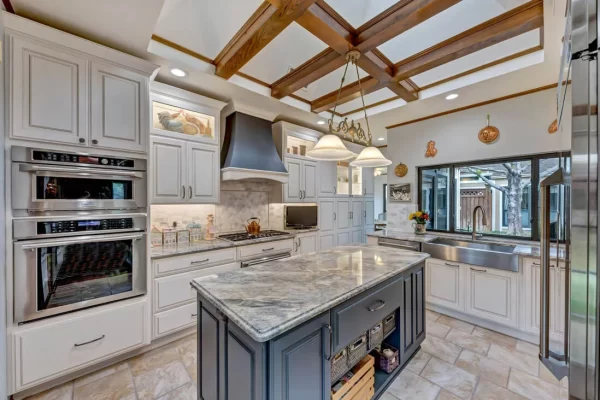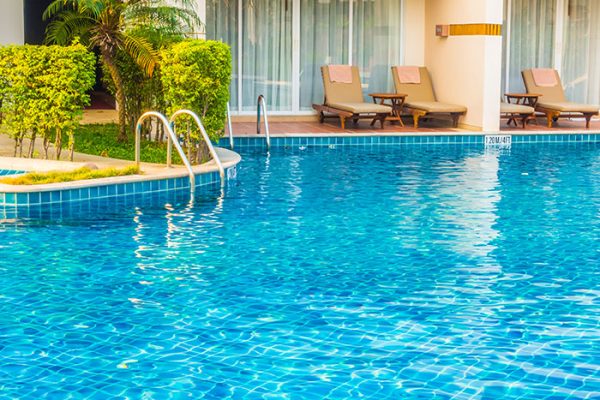Unless you live in a mild or tropical climate, there’s a high chance that you won’t use your outdoor pool throughout the year. It’s necessary to close it at the end of the season and prepare it for cold days. More on the importance of proper winterization, read here.
Winterization is required if you are not planning on opening or using your swimming area during the cold months. It’s a better option than simply closing it with a winter cover.
Pool winterization is mainly performed by experts, using professional methods and devices for testing and dosing chemicals. This service can cost you a lot, but it’s an expense you have once a year. Still, if you have time to handle preparing your swimming area for cold days, you can save a few hundred dollars.
The Right Time for Closing
If you close your pool for the season, you reduce the growth of mold and bacteria that can be harmful to your health. But you shouldn’t rush with immediate closing as soon as the temperature is below 65°F. Instead, leave the swimming area open for a few days while temperatures get lower gradually. The water will cool down slowly, and that will kill most algae that developed on the surface.
Closing time as well as preparing the pool for the winter will depend on the area in which you live. In cold areas, you must use supplies that prevent water freezing and equipment damage. On the other hand, in areas with a mild climate, you can leave the pump running low during the off-season.
In both cases, it’s necessary to balance the pool chemistry. But it’s not just about the chemicals you use for regular maintenance. You won’t clean the swimming area until the next season. So you’ll have to use additional products to keep the water pure and algae-free.
Using Pool Chemicals

There are many things in the water that you can’t see with bare eyes. In order to know its quality, you should test it regularly. Do this before closing, too, to properly prepare the swimming area for the next season. The best way to check water correctness is to use a testing kit (or activate a digital tester if you have it installed).
Certain chemicals are necessary to maintain a pool. Water in it must be chemically and bacteriologically correct. That’s why you need to use cleaning and water balancing products regularly during the season. Feel free to use the same products when preparing the swimming area for the winter.
Besides sanitizers, pool shocks, and some products to balance water alkalinity and pH value, you’ll need specialized closing pool chemicals to finish closing. When learning how to use it, make sure that you read all the instructions and indications. The mishandling can be dangerous to your health. (masalabox.com) Always wear safety gloves when using chemistry. Keep the kids and pets away while you prepare the swimming area for the cold days.
Sanitizers
Make sure that you know which one to use. Chlorine is the choice of most pool owners, as it’s safe for use. Still, in rare cases, it can cause some allergic reactions in people who are sensitive to this substance. In that case, you should opt for bromine.
If you test the water before closing, you will be surprised at what you find in it. Use sanitizers to kill all those germs and parasites in water and prepare it for the winter. As a pool pump won’t work off-season, spreading cleaning agents will be tricky. So try sanitizers in pills that slowly dissolve over time. You can leave them in covered water for months.
By default, you do pool shocking regularly. Before the final closing, preferably the night before, do the last shocking this season. If you notice algae, double the amount of product. Run the pump overnight, and repeat the test the next day. Add winterization chemicals, and you’re ready to close the swimming area.
Winterization Products
Besides standard chemicals, you will need some extra products for pool winterization. You’ll need antifreeze if you live in areas with harsh winters. If you’re not too devoted to draining pool lines regularly, they will ice. The antifreeze will prevent pipe freezing and cracking due to temperature changes.
Some of the products you might need are algaecides, pool enzymes, and metal sequestrants. These will remove organic residue, prevent metal build-up and stains, and new algae growth (in case of warm days during the off-season). After pouring them in water, access to the final closing.
The closing process is explained on the following page:
https://www.bobvila.com/articles/how-to-close-a-pool/
Proper winterization will save you from unnecessary expenses. By doing it properly, you’ll ease the next opening a lot. It will protect equipment and accessories from damage and provide you with a safe swimming area.





